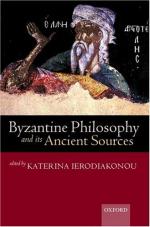|
This section contains 3,744 words (approx. 13 pages at 300 words per page) |

|
The age of the Byzantine Empire stretches from the end of late antiquity to the fall of Constantinople in 1453. During Byzantine times scholars who copied and studied or even lectured on the texts of ancient philosophers are known and praised chiefly for their efforts to transmit and to keep alive the philosophical traditions of antiquity. To take the obvious case of Plato's and Aristotle's works, there are more than 260 Byzantine manuscripts of dialogues by Plato and at least 1,000 Aristotelian texts. This does not mean, however, that all Byzantine scholars should be regarded as mere copyists. There were among them important figures who, being philosophers themselves, not only carefully studied and commented on ancient philosophical works but also wrote their own treatises on central philosophical problems.
How did the Byzantines conceive of philosophy and of themselves as philosophers? John of Damascus (Dialectica 1:56), for instance, gives six complementary...
|
This section contains 3,744 words (approx. 13 pages at 300 words per page) |

|


